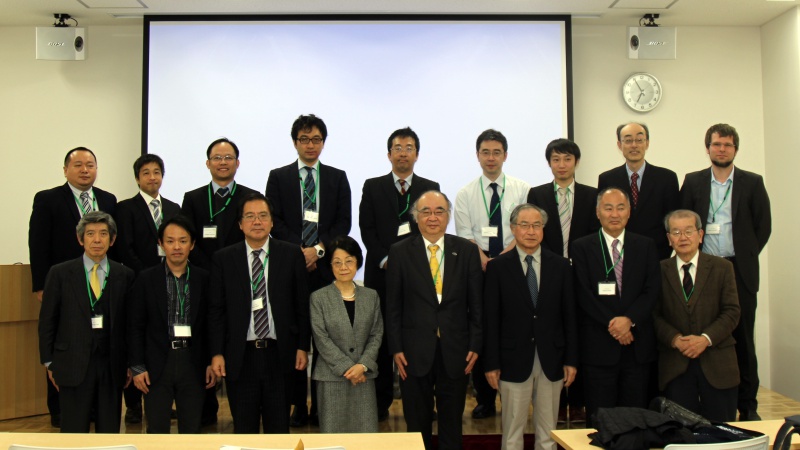ERIA Co-hosts the Joint International Economic Symposium in Kyoto
Date:
26 March 2018Category:
NewsTopics:
Innovation and Technology, SymposiumShare Article:
Print Article:
Kyoto, 2 March 2018: The Economic Research Institute for ASEAN and East Asia (ERIA) held the 'Joint International Economic Symposium on Innovation, Strategy and Survivability for East Asian Firms in the Globalised World' in Kyoto on 2 March 2018, which was attended by around 70 experts, academia, and students.
ERIA hosted the event together with Kyoto University's Graduate School of Advanced Integrated Studies in Human Survivability, Institute of Developing Economies - Japan External Trade Organization (IDE-JETRO), and Waseda University's Waseda Institute of Asia-Pacific Studies, Comprehensive Research Organization, Research Institute of Automobile & Parts Industry.
In his opening remarks, ERIA President Prof Hidetoshi Nishimura highlighted the importance of strengthening connectivity in ASEAN and East Asia for development, especially for small- and medium-sized enterprises (SMEs) in this region. Dr Masami Ishida, Director General of ERIA Support Office, IDE-JETRO, delivered the second opening remarks, in which he briefly explained ERIA and IDE-JETRO's relationship in ten years and conveyed his hope for more collaboration with Kyoto University and Waseda University in the future.
The keynote lecture was given by Prof Makoto Yano from Kyoto University, entitled 'High Quality Markets – A Prerequisite for an Innovative Society.' He identified the difference between innovation and invention, giving several examples of innovations without inventions such as conveyor belts in sushi restaurants, wheeled suitcases, and central bank notes. Furthermore, he gave an overview of his Market Quality Theory, in which he compared the market with a two-way pipe connecting technology and life. The market conveys what people need from technology for their life; therefore, the quality of the market can be measured as Life/Technology or Innovation/Needs. The success of Japanese industries was based on innovations from needs to seeds. He stated that free entry is the mother of innovation, while necessity is the mother of invention. Therefore, according to Prof Yano, ASEAN will have to maintain free entry to catch up with the rapid growth of Chinese economy.
After the opening session, the conference was divided into three sessions. The first session, 'Innovation and Strategy for East Asian Firms: Theory and Practice', discussed the theoretical background and practical use of innovations in Japan, China, and ASEAN. Two economists from ERIA, Dr Masahito Ambashi and Dr Yanfei Li, delivered their presentations in this session.
Dr Ambashi discussed the kind of innovation policy needed in each ASEAN member states (AMS) and for ASEAN as a whole. National innovation systems were highlighted as an effective policy tool since such systems organise innovation policy in a systematic manner including an active coordination role of governments.
Meanwhile, Dr Yanfei began by reviewing the theories on this topic in the literature. Then he went on to discuss the policy framework and the rapid progress of technological catching-up and innovation in China. He proposed a new theoretical framework to explain the accelerated catching-up process in China. Driving factors such as the size of market (both domestic and overseas), type of technology, policy support, and supply chain strategy appear to be the most important ones in the case of various Chinese industries.
The second session, 'Innovation and Technology Transformation for East Asian Firms’ Survival', depicted the interaction between multi-national enterprises (MNEs) and local firms in ASEAN and East Asia as well as the mechanism of technology transfers from the former to the latter. ERIA Economist Dr Yasushi Ueki moderated this session.
The third session, 'Grand Strategy for East Asian Firms Internationalisation in the Globalised Era', discussed possible East Asian firms’ strategies to maintain their competitiveness in this region by focusing on some manufacturing sectors. ERIA Senior Research Associate Fusanori Iwasaki gave a presentation entitled 'Vertical Integration of Supply Chains' by using the information from interviews as part of the 'Small and Medium Enterprises of Apparel Industry' project. Iwasaki explained that the Japanese apparel industry currently is facing some problems related to over-ordering and over-stock, which they tried to solve by introducing cost mitigating techniques to some SMEs of this industry, including by establishing vertically-integrated supply chains.
In the closing session, Dr Kayo Inaba, Executive Vice President of Kyoto University, delivered her remarks stating that in the coming decades, Asia will continue to be the primary driving force of world economics.
ERIA and the co-organisers of the symposium will hold the Second Joint International Economic Symposium in the future.








